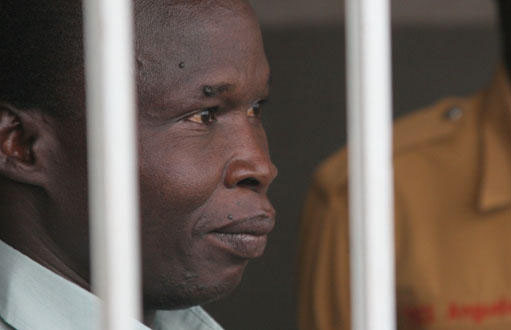
The legal quagmire of Thomas Kwoyelo remained unresolved and the former Lord’s Resistance Army rebel remained in prison last week when the court date to decide whether he would receive amnesty came and went. Justice Vincent Zehurikirize was scheduled to preside over Kwoyelo’s trial, which would rule on Kwoyelo’s application to compel the Directorate of Public Prosecutions, or DPP, and the Amnesty Commission to grant him amnesty and issue him with an amnesty certificate per an earlier constitutional court ruling that Kwoyelo was eligible for amnesty. Last week’s court date passed without convening because of a scheduling conflict, drawing out a case that began in October 2010 and last September appeared to conclude.
Thomas Kwoyelo was kidnapped by the infamous LRA at the age of 13, and he rose within the ranks of the LRA, committing human rights violations in the process. He is the first former LRA rebel to stand trial. Kwoyelo was charged with 53 counts of murder and various other crimes. He applied for amnesty through the contentious Amnesty Act of 2000. To date, close to 13,000 LRA members have been granted amnesty through this law. Kwoyelo’s renunciation of the rebellion rendered him eligible for amnesty under the act. However, he has not been afforded the same legal protections as his former comrades. Though Uganda’s constitutional court ruled in favor of his release in September, the government disregarded the decision as it cited that Kwoyelo had committed other crimes and subsequently was ineligible for amnesty. The Director of Public Prosecutions, or DPP, highlighted in his closing statement before the constitutional court last year that in addition to being charged with kidnapping with the intention to murder, Kwoyelo had also been charged with murder contrary to provisions 188 and 189 of the Penal Code. The DPP concluded that Kwoyelo was to remain incarcerated.
Kwoyelo’s case exemplifies the tension between restorative justice and Uganda’s international obligations pertaining to human rights. It also underscores the inconsistency in Uganda’s approach to dealing with former members of the LRA. An irregularity of this kind compromises any transparency that was associated with the amnesty process and could therefore undermine efforts to promote the defections of current LRA commanders and fighters. Furthermore, it could result in social costs as society develops the perception that former LRA members who attained amnesty for committing similar crimes as Kwoyelo deserve punishment. The government paved the way for such sentiments when it suggested that because amnesty was contrary to certain constitutional provisions, the pardon of former LRA rebels was erroneous.
Kwoyelo’s lawyer, Caleb Alaka, has argued that the continued imprisonment of his client and the failure to issue an amnesty certificate to Kwoyelo violates the constitutional court ruling of September 22 that granted him amnesty. Additionally, he noted that this undermined the equal protection clause, which provides Ugandans with equal protection under the law. He said the treatment against his client was discriminatory because former rebels successfully attained amnesty under the Amnesty Act.. The complications with this case perhaps signals a departure in Uganda from an amnesty process which has been instrumental in giving former LRA rebels a new start in Ugandan society. The resolution of this case will establish a precedent concerning former LRA leaders. Hopefully, that precedent will not undermine the integrity of a judicial process oriented toward meeting the needs of LRA survivors in Uganda.
The verdict on Kwoyelo’s trial is expected this week.
Photo: Defendent Thomas Kwoyelo (Radio Netherlands/Arne Doornebal)

